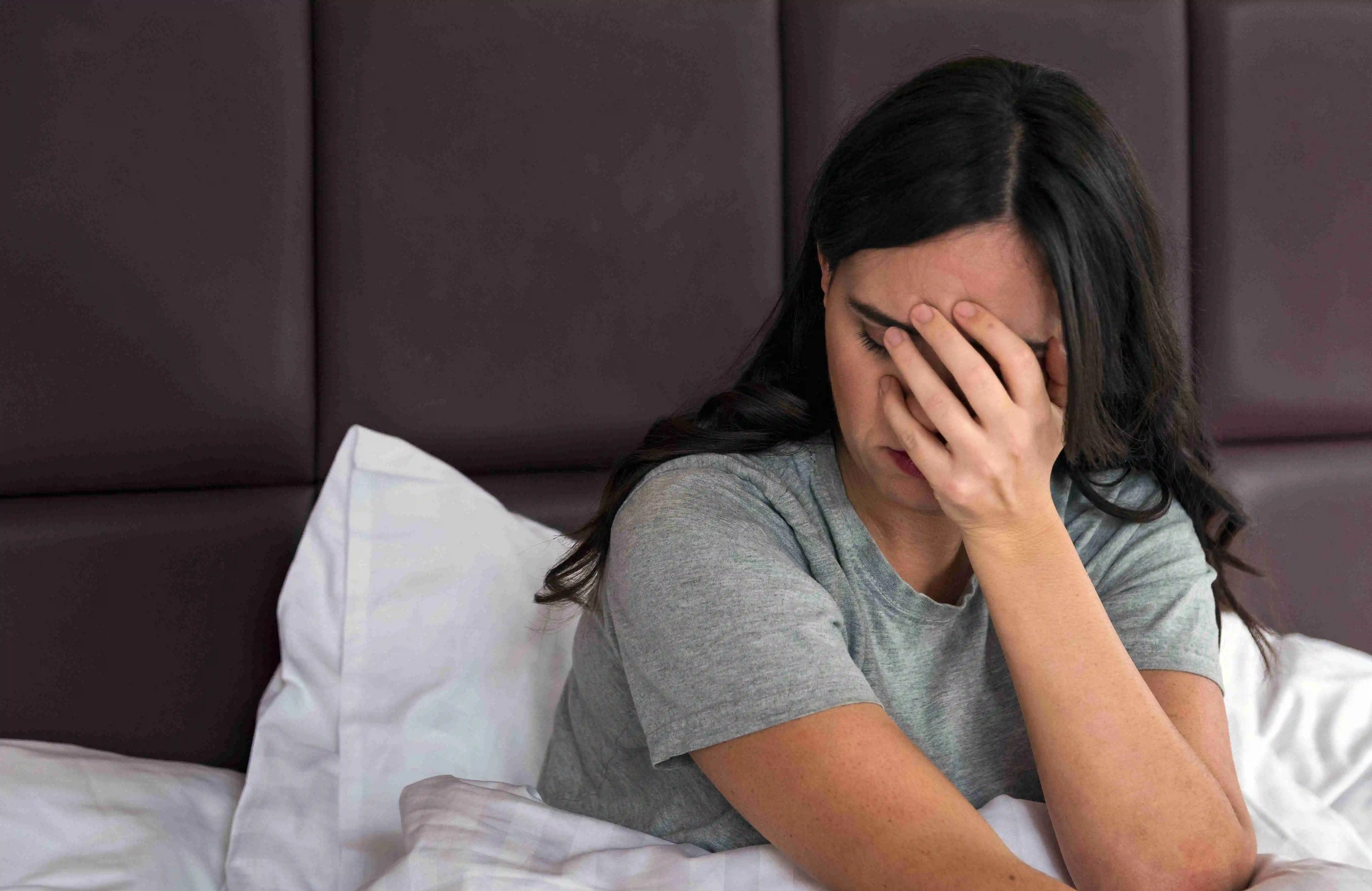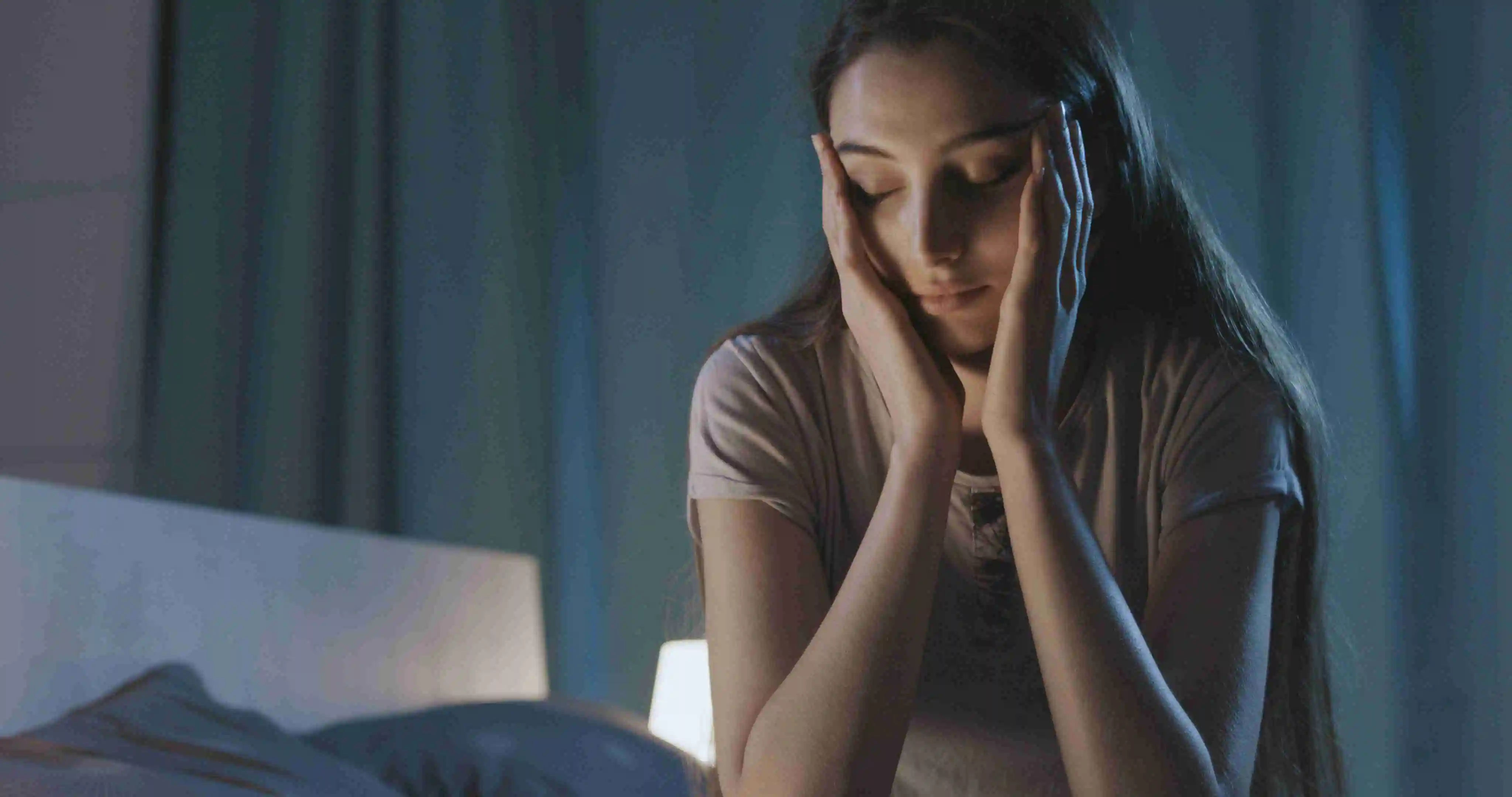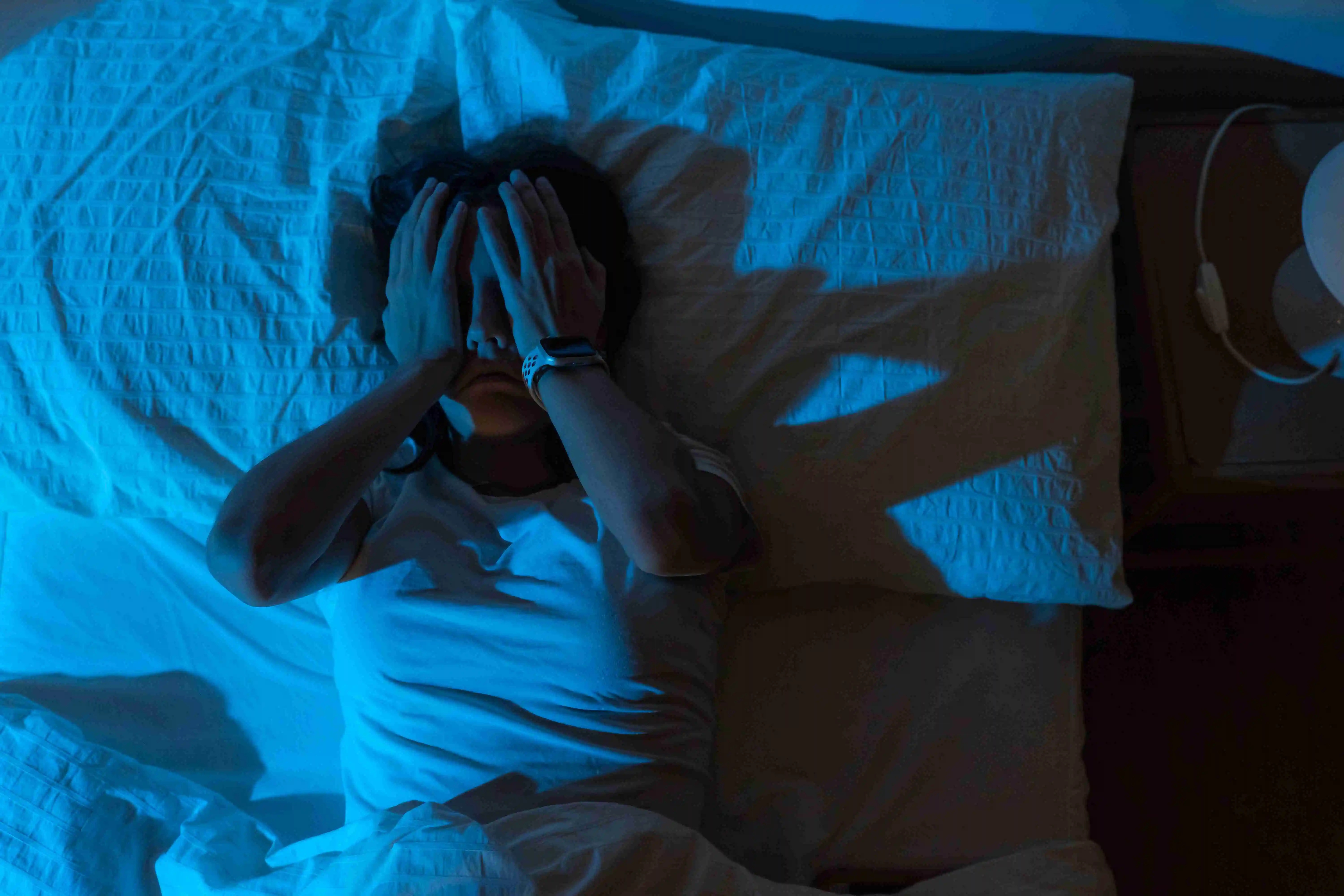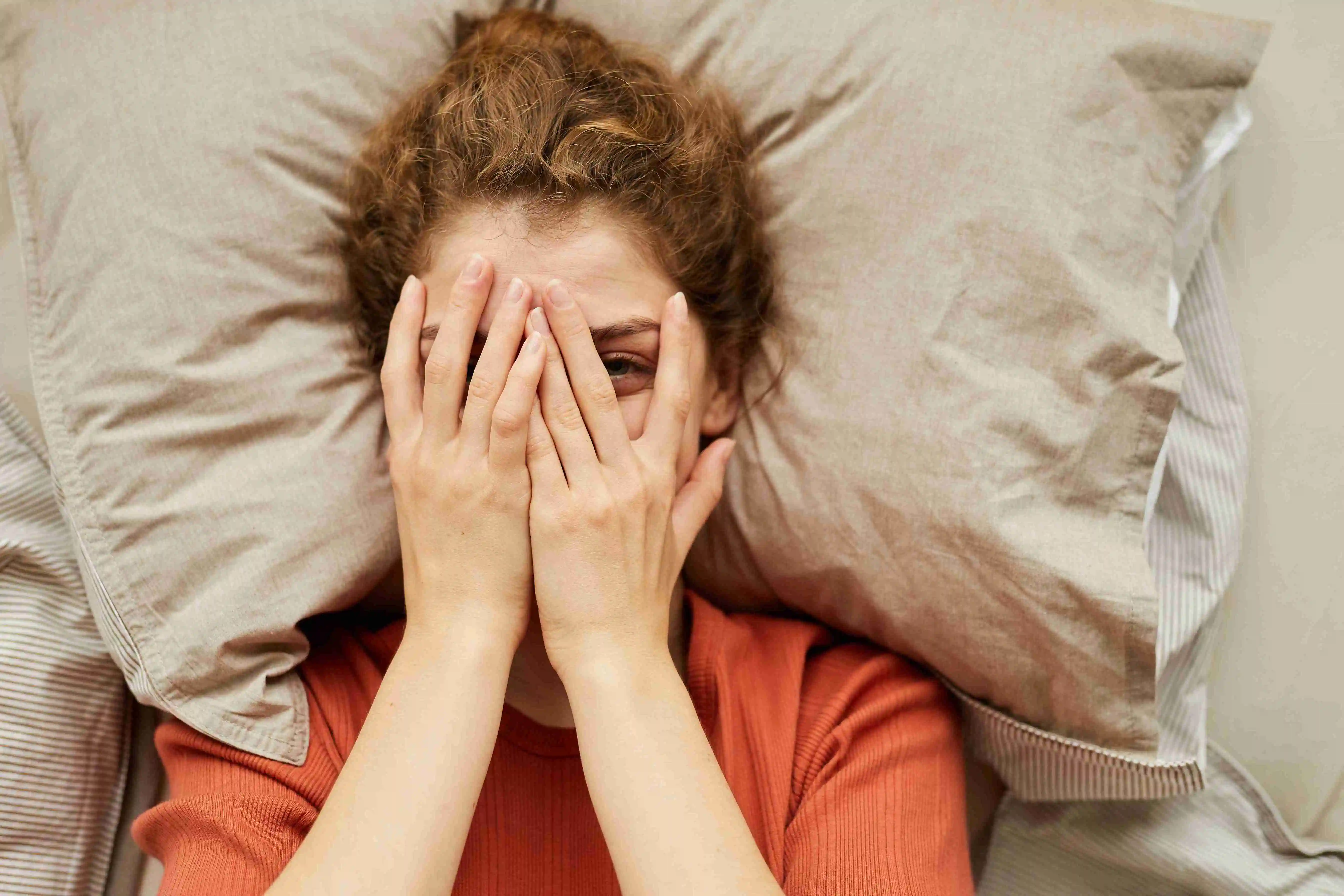Anxiety and insomnia are two closely related conditions that often go hand in hand. Many individuals who suffer from anxiety also experience difficulty falling asleep or staying asleep, leading to a vicious cycle of sleep deprivation and heightened anxiety.
Recognizing the interconnectedness of these conditions is crucial to developing effective treatment strategies.
What is anxiety, and what is its relation to insomnia?

One of the most common co-occurring conditions with anxiety is insomnia. Insomnia refers to the inability to fall asleep or stay asleep, resulting in poor-quality sleep. Anxiety can cause racing thoughts and worry, making it difficult for individuals to relax and fall asleep.
Similarly, individuals experiencing insomnia may become anxious about their lack of sleep, creating a cycle where anxiety exacerbates sleeplessness and vice versa.
This connection between anxiety and insomnia highlights the importance of addressing both conditions simultaneously for effective treatment.
Common Symptoms of Anxiety and Insomnia
There are common symptoms for both anxiety and insomnia, and it's important to know and recognize these symptoms in order to seek appropriate help and treatment.
Symptoms of Anxiety Disorders
- Excessive Worry and Fear: Individuals who experience anxiety often find themselves constantly worrying about various aspects of their lives, such as work, relationships, and health. This excessive worry can consume their thoughts and make it difficult for them to relax or unwind.
- Restlessness: A common symptom of anxiety is restlessness, as individuals with anxiety often find it difficult to sit still or relax, constantly feeling on edge or agitated. This restlessness can also manifest during sleep, leading to disrupted sleep patterns and difficulty falling or staying asleep.
- Fatigue: The constant worry, racing thoughts, and inability to get a good night's sleep, which is usually associated with anxiety, can leave individuals feeling exhausted and drained. This fatigue can have a significant impact on daily functioning, making it difficult to concentrate, stay focused, or perform tasks efficiently.
- Difficulty Concentrating: When an individual is anxious, their mind is often preoccupied with worry and racing thoughts, making it challenging to focus on the tasks at hand. They may find themselves easily distracted or unable to maintain their attention for extended periods.
- Muscle Tension: when a person is anxious, their muscles tend to tighten up, leading to feelings of stiffness and discomfort. This can be particularly noticeable in the neck, shoulders, and jaw.
- Irritability: Poor sleep can contribute to irritability and mood swings, while anxiety can make people easily irritated or agitated by even minor stressors.
- Sleep Disturbances: Many people with anxiety struggle with falling asleep or staying asleep throughout the night. Racing thoughts, worries, and feelings of restlessness can make it difficult to relax and get a good night's sleep.
- Gastrointestinal Distress: Many people experience stomachaches, nausea, and digestive problems when they are feeling anxious. This is because anxiety triggers the release of stress hormones that can affect the digestive system's function.
- Trembling: Intense feelings of fear or worry can trigger a physical response, causing tremors or shaking. An elevated heart rate or shortness of breath may accompany this trembling, which can be particularly noticeable in the hands or legs.
- Sweating: Sweating is another common symptom of anxiety, particularly during periods of heightened anxiety or panic, and it can be uncomfortable and upsetting for individuals.
Symptoms of Insomnia
- Difficulty Falling Asleep: Individuals with this condition often struggle to initiate sleep, tossing and turning for hours before finally drifting off.
- Frequent Awakenings: People who suffer from insomnia often find themselves waking up multiple times during the night, unable to maintain continuous sleep. These awakenings can be brief or prolonged, and individuals may struggle to fall back asleep once they wake up.
- Early Morning Awakening: Insomnia can cause people to wake up earlier than desired and find it difficult to fall back asleep. This can lead to feeling tired and groggy during the day, as they do not get enough restful sleep.
- Non-Restorative Sleep: Even if individuals with insomnia can fall asleep, they often wake up feeling unrefreshed and fatigued. Because their sleep quality is poor, they may experience frequent awakenings throughout the night.
- Daytime Fatigue: Individuals with insomnia often experience excessive daytime sleepiness, which can make it challenging to stay alert and focused throughout the day. This can negatively impact work or school performance and increase the risk of accidents or errors.
- Mood Disturbances: People with insomnia often experience increased irritability, anxiety, and depression. They may find themselves easily frustrated or overwhelmed by everyday tasks and interactions.
- Cognitive Impairment: Sleep is essential for proper brain function, and when we don't get enough restful sleep, our cognitive abilities can suffer. This can manifest as difficulty concentrating, memory problems, and decreased productivity.
Causes and Triggers of Anxiety-Induced Insomnia

Psychological Causes
- Persistent Stress: When individuals are under chronic stress, their bodies produce high levels of stress hormones, such as cortisol, which can interfere with the sleep-wake cycle. This can lead to sleep disturbances and difficulty falling asleep.
- Anxiety Disorders: Conditions such as generalized anxiety disorder (GAD), panic disorder, and post-traumatic stress disorder (PTSD) can cause excessive worry and intrusive thoughts that disrupt sleep. Individuals with anxiety disorders may experience heightened arousal, making it difficult to relax and fall asleep.
- Cognitive Factors: Cognitive factors also play a significant role in anxiety-induced insomnia. Negative thought patterns and excessive worrying can keep individuals awake at night. Catastrophic thinking and irrational fears can create a cycle of anxiety that perpetuates insomnia.
Behavioral Causes
- Poor Sleep Habits: Individuals who have irregular sleep patterns, such as staying up late or not adhering to a consistent sleep schedule, are more prone to experiencing anxiety-induced insomnia.
- Sleep Environment: A comfortable and conducive sleep environment is crucial for a good night's rest. However, factors such as noise, light, and an uncomfortable bed or pillow can all contribute to increased anxiety and difficulty sleeping.
- Substance Use: The consumption of substances such as caffeine, nicotine, and alcohol can disrupt sleep patterns and exacerbate feelings of anxiety. These substances act as stimulants, increasing alertness and making it harder to relax and fall asleep.
- Technology Use: In today's modern society, people are constantly connected to their devices, whether it be smartphones, tablets, or computers. The blue light emitted from these devices can disrupt the production of melatonin, a hormone that regulates sleep.
- Social Isolation: Humans are social beings, and when we lack social interaction, it can negatively impact our mental health. Social isolation can lead to feelings of loneliness, depression, and anxiety, all of which can contribute to sleep disturbances.
Physiological Causes
- Hormonal Imbalances: When there is an imbalance in these hormones, it can lead to heightened feelings of anxiety and make it difficult to fall asleep or stay asleep. For example, elevated levels of cortisol, which is often associated with chronic stress, can disrupt the natural sleep pattern and contribute to insomnia.
- Medical Conditions: Mental health disorders such as generalized anxiety disorder, panic disorder, and post-traumatic stress disorder can all interfere with sleep. These conditions often involve excessive worrying or intrusive thoughts that make it hard for individuals to relax and calm their minds before bed.
- Neurochemical Imbalance: Neurochemical imbalances also contribute to anxiety-induced insomnia. Neurotransmitters, such as serotonin and gamma-aminobutyric acid (GABA), play a crucial role in regulating mood and anxiety levels.
Effects of Anxiety-induced Insomnia on Mental Health
Anxiety-induced Insomnia can have multiple effects on our mental health, and it’s important to understand and address them promptly to mitigate its negative effects on mental health.
To know more about how mental health affects sleeping, check out the article “Mental Health”.
Heightened Stress Response
When individuals are unable to get enough sleep due to anxiety, their bodies remain in a constant state of alertness. This can lead to an increased release of stress hormones, such as cortisol, which can further exacerbate feelings of anxiety and make it even more difficult to relax and fall asleep.
Worsened Anxiety Disorders
Lack of sleep can contribute to increased feelings of restlessness, irritability, and difficulty concentrating, all of which are common symptoms of anxiety disorders. This can create a feedback loop where the lack of sleep worsens anxiety symptoms, which in turn makes it even more challenging to get a good night's sleep.
Difficulty Concentrating
Lack of sleep can leave individuals feeling fatigued and mentally drained, making it challenging to focus on tasks or retain information. This can be especially problematic in academic or professional settings where concentration is crucial for success.
Additionally, the constant worry and racing thoughts that often accompany anxiety can make it even more challenging to concentrate, as the mind is preoccupied with negative thoughts.
Memory Problems
Sleep plays a vital role in consolidating memories and retaining information. Anxiety-induced insomnia can impair an individual's ability to recall and retain information.
This can lead to difficulties in academic or work-related activities that require memory skills, such as studying for exams or completing tasks that rely on remembering instructions or details.
Irritability and Mood Swings
When individuals experience anxiety, it can be difficult for them to relax and fall asleep. This leads to a lack of quality sleep, which in turn can result in increased irritability and mood swings.
The constant feeling of exhaustion and the inability to get a good night's rest can leave individuals feeling on edge and easily agitated. These mood disturbances can further exacerbate anxiety symptoms and create a vicious cycle of sleep deprivation and emotional instability.
Reduced Judgment
Sleep plays a vital role in our ability to think clearly and make rational decisions. When we are sleep-deprived, our cognitive abilities become impaired, making it harder to concentrate, remember information, and assess situations accurately.
This can have detrimental effects on various aspects of life, including work performance, relationships, and personal well-being.
Weakened Immune System
Lack of sleep can lead to a weakened immune system, as the body does not have the opportunity to rest and recharge.
Lack of proper rest compromises the body's ability to fight off infections and illnesses, making individuals more susceptible to illness.
Cardiovascular Risks
When individuals are sleep deprived, their blood pressure tends to rise, and their heart rate increases. Over time, this can put a strain on the cardiovascular system and increase the risk of developing heart disease or experiencing a heart attack.
Depression
The constant worry and stress associated with anxiety can also contribute to feelings of hopelessness or sadness. It becomes a vicious cycle as anxiety keeps individuals awake at night, leading to further exhaustion and increased anxiety during the day.
Depression could have a significant impact on sleeping, If you want to know more about that topic, check the article “Depression and Sleep”.
Types of Anxiety Disorders
Each type of anxiety disorder has unique symptoms and diagnostic criteria, necessitating a strict treatment plan to enhance your overall health and well-being.
Generalized Anxiety Disorder (GAD)
Generalized Anxiety Disorder (GAD) is one of the most common types of anxiety disorders. It is characterized by excessive worry and fear about everyday situations and events.
People with GAD often have trouble controlling their worries, which can interfere with their daily functioning.
Panic Disorder
Panic Disorder is another type of anxiety disorder characterized by recurrent panic attacks. Panic attacks are sudden, intense episodes of fear or discomfort that reach their peak within minutes.
During a panic attack, individuals may experience symptoms such as shortness of breath, heart palpitations, trembling, and a sense of impending doom.
Social Anxiety Disorder
Social Anxiety Disorder, also known as social phobia, is a type of anxiety disorder characterized by an intense fear of social situations.
Individuals with social anxiety disorder may fear being embarrassed or humiliated in front of others and may avoid social situations altogether. This can greatly impact their social and occupational functioning, leading to feelings of isolation and low self-esteem.
Specific Phobias
Specific phobia is an anxiety disorder characterized by an intense fear or anxiety about a specific object or situation. Common examples of specific phobias include fear of sleep, spiders, heights, or flying.
These fears can cause significant distress and lead to avoidance behaviors. Treatment for specific phobias may involve exposure therapy, where individuals gradually confront their fears in a controlled environment.
Obsessive-Compulsive Disorder (OCD)
Obsessive-Compulsive Disorder (OCD) is another common anxiety disorder characterized by intrusive thoughts (obsessions) that lead to repetitive behaviors or mental acts.
People with OCD frequently engage in rituals or behaviors to reduce the anxiety that their obsessions cause. These rituals can be time-consuming and interfere with daily activities.
Separation Anxiety Disorder
Children often suffer from separation anxiety disorder, but it can also impact adults. Individuals with this disorder experience extreme fear or distress when separated from a loved one or their usual environment.
Intense fears of abandonment or harm may lead to avoidance behaviors and difficulties with daily activities.
Therapy and support from loved ones can help manage separation anxiety disorder.
Post-traumatic Stress Disorder (PTSD)
PTSD is a type of anxiety disorder that occurs after experiencing or witnessing a traumatic event. This could include incidents like natural disasters, accidents, or acts of violence.
People with PTSD often have flashbacks, nightmares, and intrusive thoughts related to the traumatic event. They may also experience emotional numbness, avoidance of reminders, and increased arousal. Treatment options for PTSD include therapy, medication, and support groups.
Learn More: How Trauma Affects Sleep.
Diagnosis and Assessment of Anxiety-Related Insomnia

If you find yourself relating to some of the common symptoms of anxiety-related insomnia, it’s crucial to seek the proper help from a professional after diagnosing your anxiety-related insomnia.
Clinical Assessment
Clinical assessment of individuals experiencing anxiety-induced insomnia is crucial to identifying the root causes and developing appropriate treatment plans.
A comprehensive clinical assessment includes evaluating the individual's sleep patterns, overall mental health, and any underlying medical conditions that may be contributing to their insomnia.
Sleep Assessment
Sleep assessments entail monitoring the individual's sleep patterns, duration, and quality using a variety of tools, such as sleep diaries or actigraphy devices.
This assessment helps identify any disruptions in sleep architecture and provides valuable insights into the severity of insomnia symptoms.
Assessment Tools and Scales
Assessment tools and scales are essential in identifying and diagnosing anxiety-induced insomnia. These tools help clinicians assess the severity of anxiety and insomnia symptoms, track changes over time, and determine the most appropriate treatment interventions.
Differential Diagnosis
If you're suffering from insomnia, it's important to see a professional to check if the main cause of insomnia is anxiety or another diagnosis, so you can begin your treatment plan, which will specifically address and target your diagnosis.
Treatment Planning
People who suffer from insomnia need a treatment plan for anxiety-induced insomnia that focuses on addressing underlying anxiety disorders and improving sleep quality.
Coping Strategies and Self-Help Techniques
Anxiety-induced insomnia can be a challenging condition to cope with, as it often leads to difficulty falling asleep or staying asleep throughout the night. However, there are several coping strategies and self-help techniques that can be effective in managing this condition.
Deep Breathing
Deep breathing, a coping strategy for anxiety-induced insomnia, involves taking slow, deep breaths to trigger the body's relaxation response.
By focusing on the breath and consciously slowing it down, individuals can calm their nervous system and reduce feelings of anxiety that may be contributing to their insomnia.
You can practice deep breathing exercises before bed or whenever anxiety arises throughout the day.
Progressive Muscle Relaxation (PMR)
Progressive muscle relaxation (PMR) is another technique that can help individuals with anxiety-induced insomnia. PMR involves systematically tensing and relaxing different muscle groups to promote relaxation and release physical tension.
By consciously focusing on each muscle group, individuals can bring awareness to areas of tension and then release it, allowing for a more relaxed state.
Meditation
Meditation and yoga are a widely recognized self-help technique that can be beneficial for both anxiety and insomnia. By engaging in regular meditation practice, individuals can learn to quiet their minds, reduce racing thoughts, and promote a sense of inner calm.
Consistent Sleep Schedule
Establishing consistent sleep habits and routines can also greatly improve sleep quality for those with anxiety-induced insomnia. This includes going to bed and waking up at the same time each day, creating a relaxing bedtime routine, and ensuring a comfortable sleep environment.
To know more about how to create the most ideal bedtime routine, check out the article “Bedtime Routine Guide”.
Comfortable Bedding
One important aspect to consider if you want to combat the side effects of anxiety-induced insomnia is creating a comfortable sleeping environment, starting with comfortable bedding. Investing in a high-quality mattress and pillows that provide adequate support and promote relaxation can significantly improve sleep quality.
Avoid Stimulants
Stimulants like caffeine, nicotine, and alcohol can interfere with sleep and exacerbate anxiety symptoms. It is advisable to limit or completely avoid their consumption, particularly close to bedtime.
Individuals with anxiety-induced insomnia should opt for calming herbal teas or warm milk, which can have a soothing effect on the mind and body.
Reduce Screen Time
Melatonin is a hormone that controls sleep-wake cycles, and the blue light that electronic devices like smartphones, tablets, and televisions emit can interfere with its production. Establishing a screen-free routine at least an hour before bedtime can help signal the body to prepare for sleep.
Regular Exercise
Studies have shown that exercise positively impacts both anxiety and the quality of sleep. It helps to reduce stress levels, release tension, and promote relaxation, all of which can contribute to better sleep.
Incorporating at least 30 minutes of moderate-intensity exercise into your daily routine can greatly improve your ability to fall asleep and stay asleep throughout the night.
Write Down your Thoughts
Another helpful technique is to write down your thoughts before going to bed. Anxiety often leads to racing thoughts and worries, making it difficult to quiet the mind when it's time to sleep.
By taking a few minutes to write down your thoughts and concerns, you can help release some of the mental burden and create a sense of clarity.
This practice can also serve as a way to track patterns and identify triggers for anxiety-induced insomnia, allowing you to develop more targeted coping strategies.
Seeking Support
Seeking support from others can be beneficial in managing anxiety-induced insomnia. Talking about your experiences and concerns with trusted friends, family members, or support groups can provide validation, understanding, and practical advice.
Support from others can help alleviate feelings of loneliness and isolation that often accompany insomnia.
Treatment Options for Anxiety and Insomnia
Several treatment options are available to minimize the negative impact of anxiety and insomnia.
Cognitive-Behavioral Therapy for Insomnia (CBT-I)
CBT-I is a form of therapy that focuses on identifying and changing negative thoughts and behaviors that contribute to sleep problems. It helps individuals develop healthy sleep habits and relaxation techniques to promote better sleep.
Individuals typically conduct CBT-I with a therapist, but group therapy sessions can also be beneficial for some individuals.
Medications
- Sedative-Hypnotics: People typically use sedative-hypnotics, such as zolpidem and zaleplon, to treat insomnia by promoting sleep and assisting people in staying asleep throughout the night.
- Anxiolytics: Sedative hypnotics promote sleep, while anxiolytics help reduce anxiety symptoms.
Group Therapy
Group therapy provides a supportive environment where individuals can share their experiences and learn from one another, and it has proven its effectiveness in alleviating the negative effects of anxiety and minimizing insomnia in people who suffer from it.
Herbal Supplements
For centuries, people have used herbal supplements like valerian root, chamomile, and lavender to promote relaxation and improve the quality of their sleep. You can take these supplements as teas, capsules, or tinctures.
However, it is important to consult with a healthcare professional before starting any herbal supplement regimen, as they may interact with certain medications or have side effects.
Acupuncture
Acupuncture is a traditional Chinese medicine practice that involves inserting thin needles into specific points on the body to stimulate energy flow and promote overall well-being. Research has shown that acupuncture can help reduce anxiety symptoms and improve sleep quality.
However, it is important to find a qualified and licensed acupuncturist for safe and effective treatment.
FAQs
How can I prevent sleep anxiety?
Establishing a consistent bedtime routine can signal to your body that it is time to relax and unwind, which can help minimize sleep anxiety. Creating a comfortable sleep environment is crucial. Ensure that your bedroom is dark, quiet, and at a comfortable temperature. Additionally, try to limit your use of electronic devices before bed because the blue light they emit can interfere with your sleep-wake cycle.
How is sleep anxiety diagnosed?
It can be challenging to diagnose sleep anxiety because it shares symptoms with other sleep disorders and anxiety disorders. To diagnose sleep anxiety, a healthcare professional will typically conduct a comprehensive evaluation. This may involve a detailed medical history, a physical examination, and a psychological assessment.
How common is sleep anxiety?
Despite the lack of specific research, estimates suggest that sleep anxiety is relatively common. Studies suggest that approximately 30–40% of adults experience some form of sleep anxiety at some point in their lives. However, the actual prevalence may be higher, as many individuals may not seek professional help or may not even realize that their sleep difficulties are related to anxiety.
How can anxiety affect sleep?
Anxiety can have a profound impact on sleep quality and duration. When individuals experience anxiety, their minds are often consumed with worry, fear, and racing thoughts. This mental state can make it difficult to relax and fall asleep. Anxiety can also cause physical symptoms such as increased heart rate, muscle tension, and restlessness, which further disrupt sleep. Additionally, anxiety can lead to insomnia, a condition characterized by difficulty falling asleep or staying asleep throughout the night.
Can anxiety medications cause or worsen insomnia?
Individuals suffering from anxiety disorders commonly receive prescriptions for anxiety medications. While these medications can be effective in reducing anxiety symptoms, they can also have unintended side effects, such as insomnia.
Can lifestyle changes alone improve both anxiety and insomnia?
While there are various treatment options available, lifestyle changes alone can indeed improve both anxiety and insomnia. Engaging in regular physical exercise, practicing relaxation techniques such as meditation or deep breathing exercises, and maintaining a healthy diet can have a positive impact on both conditions.
What are some lesser-known causes of insomnia linked to anxiety?
Excessive worry about the future is one cause of anxiety. Many people with anxiety tend to obsessively think about what might happen and the potential negative consequences. This constant fretting can greatly interfere with falling asleep and staying asleep throughout the night. Another lesser-known cause is the fear of sleep itself. Some individuals with anxiety develop a fear of losing control or experiencing nightmares while asleep, leading to increased anxiety and difficulty falling asleep.
How can I maintain consistent sleep patterns while managing fluctuating anxiety levels?
Maintaining consistent sleep patterns can be challenging when dealing with fluctuating anxiety levels. However, several strategies can help in managing both aspects effectively, such as establishing a regular sleep schedule, creating a relaxing bedtime routine, and managing anxiety levels through techniques like mindfulness meditation or therapy.
Conclusion
Anxiety and insomnia are closely intertwined conditions that can significantly impact an individual's well-being. Recognizing the relationship between these conditions is essential to developing effective treatment plans.
By addressing the underlying causes of anxiety and implementing strategies to promote relaxation and better sleep, individuals can break the cycle of anxiety-related insomnia and improve their overall quality of life.
Kelsey Butler, MS, RDN
Kelsey Butler is a Registered Dietitian Nutritionist with a Master's in Nutrition Sciences. She is an expert in nutrition research, coaching, and content development. Kelsey takes a mindful approach toward health and values building relationships with all foods. She understands the need to set personalized goals because not one size fits all, from dietary preferences to lifestyle habits.


